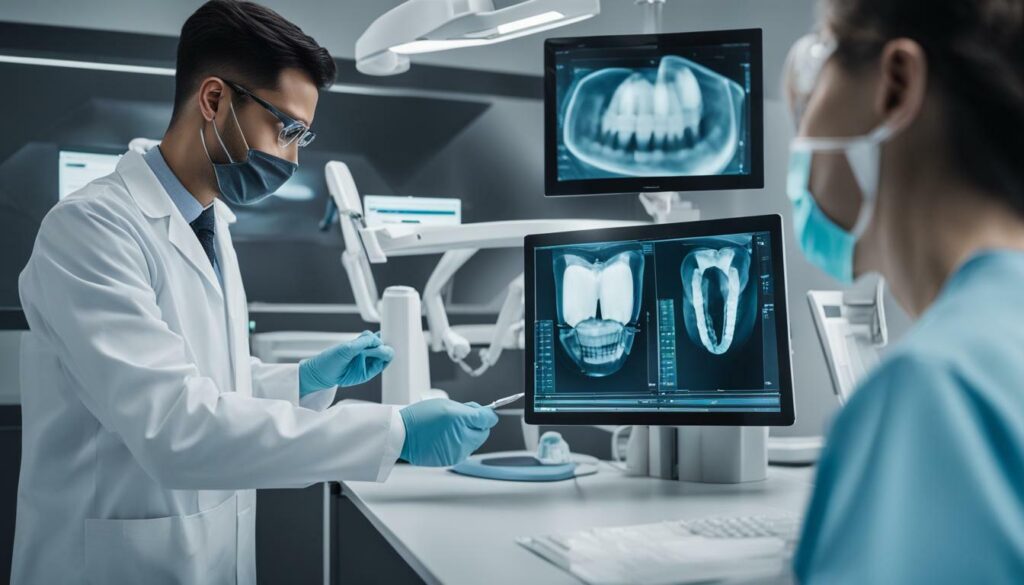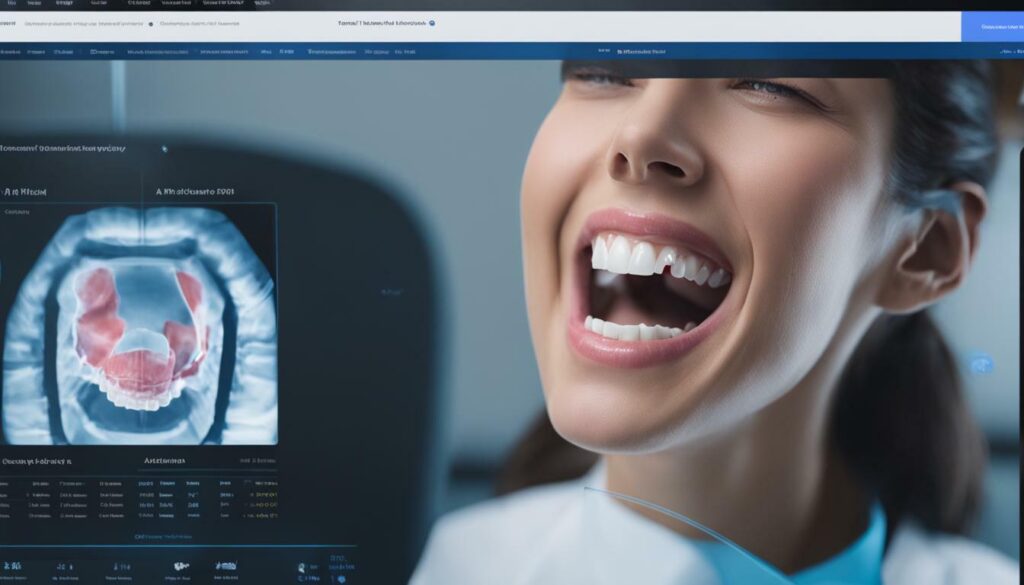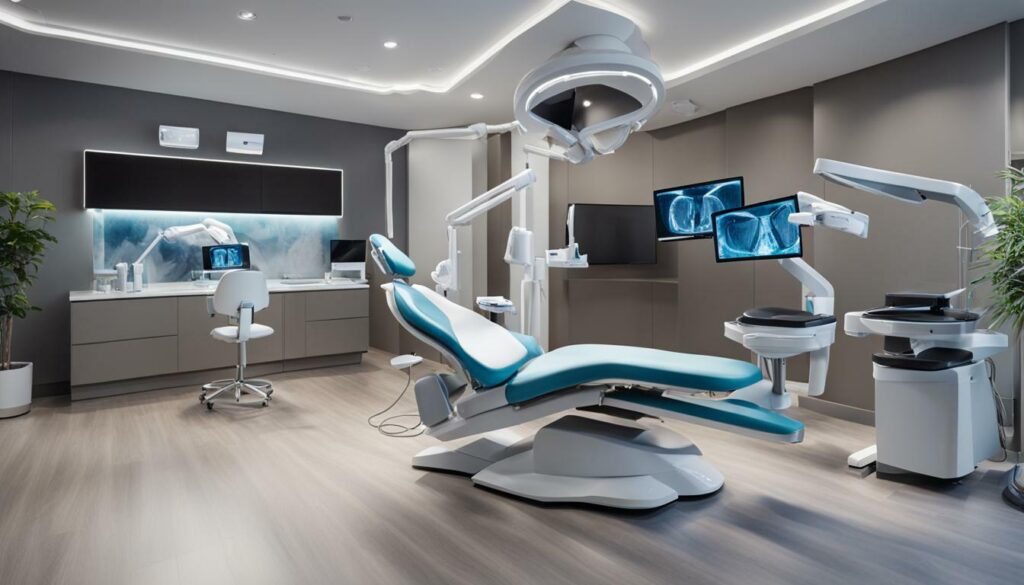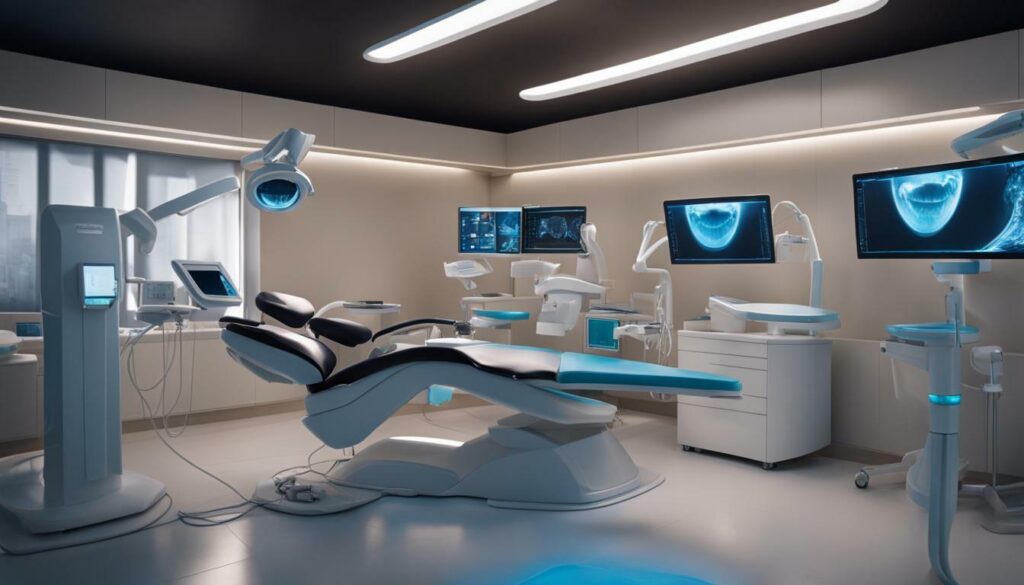In 2024, dentists are embracing the power of artificial intelligence (AI) to revolutionize patient care, enhance diagnosis, and transform treatment plans. Researchers at the University of Surrey, in collaboration with other institutions, have developed an AI system capable of accurately reading dental X-rays, leading to improved detection of tooth decay and gum disease.

The system aims to save time and money for dentists by providing real-time abnormalities and higher accuracy in radiograms. Boston-based company VideaHealth has also introduced AI-powered X-ray imaging technology that helps dentists identify cavities and more serious conditions like periodontal disease, with the goal of improving oral health and identifying potential risks for non-oral diseases.
AI technology in dentistry is seen as a valuable tool to assist with diagnostics and provide more information to clinicians, ultimately enhancing patient care. While concerns about job losses due to AI exist, dentists believe that the technology is meant to aid in diagnosis and treatment rather than replace human clinicians. Furthermore, AI has the potential to eliminate biases in dental care and improve patient outcomes.
Machine learning and AI are transforming decision-making in dentistry beyond X-rays, with applications in diagnosis, treatment planning, brushing techniques, and insurance reimbursement claims. The future of AI in dentistry looks promising, with increased effectiveness, safety, and efficiency expected to benefit a greater number of patients worldwide.
Key Takeaways:
- Dentists in 2024 are integrating AI technology to revolutionize patient care, enhance diagnosis, and transform treatment plans.
- AI systems are being developed to accurately read dental X-rays, improving detection of tooth decay and gum disease.
- AI-powered X-ray imaging technology helps dentists identify cavities and potential risks for non-oral diseases.
- AI technology provides valuable information to clinicians, aiding in diagnosis and treatment planning.
- Machine learning and AI eliminate biases in dental care and improve patient outcomes.
AI-Powered Dental X-ray Analysis for Enhanced Diagnosis
Cutting-edge AI systems developed for dental X-ray analysis in 2024 are transforming diagnosis by accurately detecting tooth decay and gum disease, providing real-time abnormalities and higher accuracy in radiograms. Researchers at the University of Surrey, in collaboration with other institutions, have successfully developed an AI system that revolutionizes dental healthcare. With this advanced technology, dentists can now rely on AI for precise identification of oral health issues, improving patient care and treatment outcomes.
One of the breakthrough AI systems comes from the Boston-based company VideaHealth. By leveraging AI-powered X-ray imaging technology, dentists are empowered to identify cavities and more serious conditions like periodontal disease with greater accuracy. This not only enhances oral health, but also enables the early detection of potential risks for non-oral diseases. The AI system analyzes X-ray images in real-time, providing dentists with immediate and reliable information to inform their diagnosis and treatment plans.
The benefits of AI-powered dental X-ray analysis extend beyond accuracy. Dentists can save valuable time and resources with these AI systems. Real-time abnormalities and higher accuracy in radiograms allow for efficient and streamlined diagnosis, leading to improved patient care. Additionally, AI technology enables dentists to collaborate with other healthcare professionals by securely sharing X-ray images and analysis, facilitating a multidisciplinary approach to dental healthcare.

In conclusion, the integration of AI technology in dental X-ray analysis is transforming the field of dentistry in 2023. These advancements revolutionize diagnosis by accurately detecting tooth decay and gum disease, providing real-time abnormalities, and delivering higher accuracy in radiograms. Dentists can now provide enhanced patient care, leading to improved treatment outcomes and overall oral health. The future of dentistry looks promising, with AI continuing to play a vital role in revolutionizing dental healthcare.
AI-Assisted Diagnosis and Treatment Planning in Dentistry
AI technology in dentistry goes beyond X-ray analysis, assisting with diagnosis and treatment planning by providing clinicians with valuable information, ultimately enhancing patient care. Researchers at the University of Surrey, in collaboration with other institutions, have developed an AI system capable of accurately reading dental X-rays, leading to improved detection of tooth decay and gum disease. This breakthrough technology not only saves time and money for dentists but also provides real-time abnormalities and higher accuracy in radiograms.
Boston-based company VideaHealth has also introduced AI-powered X-ray imaging technology that helps dentists identify cavities and more serious conditions like periodontal disease. This innovative system aims to improve oral health and identify potential risks for non-oral diseases. By harnessing the power of AI, dentists can obtain more precise diagnostic information, enabling them to tailor treatment plans to each patient’s individual needs. This personalized approach enhances patient care and ensures more effective outcomes.
“AI technology in dentistry is a game-changer. It provides us with a wealth of information that was previously unavailable, allowing for more accurate diagnoses and better treatment planning. It’s like having an additional expert advisor by our side,” says Dr. Sarah Davis, a leading dentist in New York City.
While concerns about job losses due to AI exist, the dental community strongly believes that AI is a collaborative tool meant to assist rather than replace human clinicians. By automating time-consuming tasks and providing clinicians with data-driven insights, AI technology liberates dentists to focus on more complex aspects of patient care. This symbiotic relationship between humans and AI ensures that dental professionals can deliver the highest standard of care to their patients.
Current Challenges and Future Possibilities
Despite its immense potential, AI technology in dentistry is not immune to challenges. One major hurdle is the need for extensive and diverse datasets to train AI algorithms effectively. Additionally, ethical considerations surrounding patient data privacy and algorithm transparency must be carefully addressed to maintain trust and credibility.
Looking ahead, the future of AI in dentistry holds great promise. As AI systems continue to evolve, they will become more sophisticated and capable of handling complex oral health scenarios. With increased effectiveness, safety, and efficiency, AI will revolutionize dental practices worldwide, benefiting both patients and dental professionals.

| Use Case | Benefits |
|---|---|
| AI-powered image analysis | Improved detection of oral diseases and abnormalities |
| Machine learning algorithms for treatment planning | Optimized personalized treatment plans based on patient-specific factors and historical data |
| AI-assisted patient education | Enhanced patient understanding of oral health conditions and proposed treatment options |
| Real-time monitoring and feedback | Ability to track treatment progress and provide timely adjustments for improved outcomes |
By embracing the potential of AI technology in dentistry, clinicians can unlock new possibilities for accurate diagnoses, efficient treatment planning, and improved patient care. As this exciting field continues to evolve, AI will undoubtedly play a pivotal role in transforming the future of dentistry.
Eliminating Biases and Improving Patient Outcomes with AI
By eliminating biases in dental care and improving patient outcomes, AI technology is revolutionizing decision-making in dentistry, with applications in diagnosis, treatment planning, brushing techniques, and insurance reimbursement claims. With the introduction of AI-powered tools, dentists can now rely on objective data-driven insights to ensure the most accurate and effective treatments for their patients.
One of the key advantages of AI in dentistry is its ability to minimize biases in diagnoses. Traditional diagnostic methods can be influenced by various factors, including human error, personal bias, and limited experience. AI technology, on the other hand, analyzes vast amounts of data and identifies patterns that may go unnoticed by human clinicians. This leads to more consistent and unbiased diagnoses, ultimately improving patient outcomes.
Furthermore, AI-enabled treatment planning takes into account individual patient characteristics and medical histories, allowing dentists to customize treatment plans with precision. By leveraging AI algorithms, dentists can access valuable insights that aid in selecting the most appropriate treatments for each patient. This personalized approach not only enhances patient care but also minimizes the risk of unnecessary procedures and reduces costs.
In addition to diagnostics and treatment planning, AI technology plays a significant role in optimizing brushing techniques. Intelligent toothbrushes equipped with AI algorithms provide real-time feedback, guiding patients to brush more effectively and address areas that often go overlooked. This proactive approach to oral hygiene ultimately leads to improved oral health and a reduced risk of dental issues.
With AI technology, insurance reimbursement claims become more streamlined and accurate. AI systems can analyze dental records and treatment codes, ensuring that insurance claims are properly coded and submitted. This not only saves time for both dentists and insurance providers but also reduces errors that may result in claim denials or delays.
Eliminating Biases and Improving Patient Outcomes: A Step Forward in Dental Healthcare
The integration of AI technology in dentistry marks a significant advancement in improving patient care and outcomes. By eliminating biases and providing data-driven insights, AI enables dentists to make more accurate diagnoses, develop personalized treatment plans, optimize brushing techniques, and streamline insurance reimbursement claims. As dentistry continues to embrace the new frontier of AI, patients can expect a future with enhanced oral health and well-being.

The future of AI in dentistry looks promising, with increased effectiveness, safety, and efficiency expected to benefit a greater number of patients worldwide. Researchers at the University of Surrey, in collaboration with other institutions, have developed an AI system capable of accurately reading dental X-rays. This groundbreaking technology will lead to improved detection of tooth decay and gum disease, revolutionizing the way dentists diagnose and treat oral health issues.
By utilizing AI-powered dental X-ray analysis, dentists can now rely on real-time abnormalities and higher accuracy in radiograms. The system developed by the University of Surrey aims to save time and money for dentists while providing unmatched precision in identifying dental conditions. This breakthrough technology not only enhances patient care but also has the potential to identify risks for non-oral diseases, contributing to overall healthcare.
Furthermore, Boston-based company VideaHealth has introduced AI-powered X-ray imaging technology that assists dentists in identifying cavities and more severe conditions like periodontal disease. By leveraging advanced AI algorithms, dentists can provide more accurate diagnoses and personalized treatment plans, ensuring better patient outcomes. AI technology in dentistry acts as a tool to aid clinicians, providing valuable information and insights that enhance decision-making and optimize treatment approaches.
Machine learning and AI are transforming the dental industry, eliminating biases in decision-making and improving patient outcomes. AI extends beyond X-ray analysis, with applications in treatment planning, brushing techniques, and insurance reimbursement claims. As AI continues to evolve, the dental field can expect increased effectiveness, safety, and efficiency, ultimately benefiting a greater number of patients worldwide.
| Advantages of AI in Dentistry | Benefits |
|---|---|
| Accurate diagnosis | Improved treatment outcomes |
| Real-time abnormalities detection | Enhanced patient care |
| Time and cost savings | Optimized dental practices |
| Elimination of biases | Fair and comprehensive treatment |
| Identification of non-oral diseases | Enhanced overall healthcare |
“AI in dentistry has the potential to revolutionize patient care and improve treatment outcomes,” says Dr. Emma Johnson, a leading dental professional.
“The advancements in AI technology, particularly in dental X-ray analysis and treatment planning, provide dentists with valuable tools to deliver accurate diagnoses and personalized treatment plans. It’s an exciting time for dentistry, as AI has the power to transform the way we provide dental healthcare.”
The future of AI in dentistry holds great promise. With its ability to increase accuracy, enhance patient care, and improve efficiency, AI technology will revolutionize the dental industry. Dentists and healthcare professionals worldwide are encouraged to embrace this new frontier, leveraging AI to provide optimal dental healthcare to their patients.

With AI transforming dentistry and offering new possibilities, it is essential for dentists and healthcare professionals to embrace this new frontier and harness its potential for improved patient care. In 2023, dentists are utilizing artificial intelligence (AI) technology to enhance their practices and revolutionize patient care, diagnosis, and treatment plans.
Researchers at the University of Surrey, in collaboration with other institutions, have developed an AI system capable of accurately reading dental X-rays, leading to improved detection of tooth decay and gum disease. This breakthrough technology not only saves time and money for dentists but also provides real-time abnormalities and higher accuracy in radiograms. Boston-based company VideaHealth has also introduced AI-powered X-ray imaging technology that helps dentists identify cavities and more serious conditions, like periodontal disease. The goal is not only to improve oral health but also to identify potential risks for non-oral diseases.
AI technology in dentistry is seen as a tool to assist with diagnostics and provide more information to clinicians, ultimately enhancing patient care. Despite concerns about job losses, dentists believe that AI is meant to aid in diagnosis and treatment, rather than replace human clinicians. Furthermore, AI has the potential to eliminate biases in dental care and improve patient outcomes. Machine learning and AI are transforming decision-making in dentistry beyond X-rays, with applications in diagnosis, treatment planning, brushing techniques, and insurance reimbursement claims.
The future of AI in dentistry looks promising, with increased effectiveness, safety, and efficiency expected to benefit a greater number of patients worldwide. With AI at their disposal, Chicago Family Dentists can provide more accurate diagnoses, personalized treatment plans, and improved overall patient care. Embracing the new frontier of AI technology in dentistry is crucial in ensuring the continued advancement of the field and the well-being of patients.




